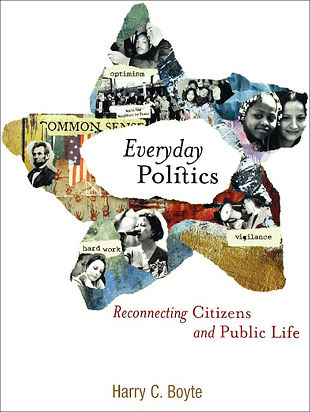Harry C. Boyte is co-director of the Center for Democracy and Citizenship at the Humphrey Institute and the author of eight books on citizenship, community organizing, and democracy. He believes that government alone cannot handle and/or solve democracy's daunting and wide-ranging troubles.
Politics, as Aristotle and many others have argued, means of the citizens. Boyte has picked up this emphasis in his work at the Humphrey Institute where citizen politics is defined as "ordinary people of different views and interests working together to define and to solve problems."
The renewal of democracy, he posits, lies beyond the "red" and "blue" electoral map of the United States, the rancorous divisiveness of partisan politics, and the dead-end maneuvers of political professionals. As he states in the subtitle of this book, everyday politics reconnects citizens and public life. With a surge of creative energy and gusto, the author moves boldly in his explanations of citizenship as public work, citizen education as a craft, professions as public work, the art of spreading everyday politics, public life in the information age, and inspiring visions of freedom and a new commonwealth.
Quotes to Think About
What Is Everyday Politics?
"It is the central argument of Everyday Politics that ... hands-on, accessible, and community-rooted politics is an alternative to politics as usual with far ranging possibilities. Everyday politics reconnects citizens and public life. It holds the potential to re-knit the two strands of populism — progressive challenges to corporate power and conservative challenges to liberal professionals — that have bitterly divided America into blue regions and red regions on the electoral map. Across the world, everyday politics can generate the civic energy and talent to address the multiplying problems that governments alone cannot solve, but which cannot be solved without government. It is also a democratizing politics, the way to revitalize the public life of institutions, from schools to universities, religious congregations to public health clinics and neighborhood associations, where a narrow meritocratic professionalism now stifles citizen creativity.
"To develop and spread such a politics will require a continuing process of learning across national boundaries. But the core elements are already clear."
Citizen Activists on the Move
"Everyday politics, attentive to the complex power relations of the twenty-first century, holds the potential to regenerate vision and hope within and across societies. … Because it generates hope, another outcome of the spread of everyday politics will be the consciousness that we are not at 'the end of history,' as those such as Francis Fukuyama would have it. Rather, we are at the threshold of history. We stand at the beginning of a world in which free citizens, across boundaries and borders, learn to act together in consciously political ways to create the future."
